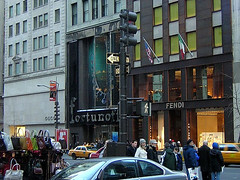Speaking of Car-Centered Municipal Policies (in NYC)
 Gucci, Fortunoff & Fendi, 5th Avenue. Flickr photo by Squids.
Gucci, Fortunoff & Fendi, 5th Avenue. Flickr photo by Squids.Gotham Gazette is an e-newsletter and website advocacy project focused on civic issues in the five boroughs of New York City. It's produced by the Citizens Union Foundation.
The website has standing sections on a variety of topics-issues such as transportation, land use, immigration, etc.
Tom Angotti, a professor at Hunter College, and one of the founders of Planners Network, an association of progressive urban planners, writes most of their pieces on land use issues. This month's story is "Livable Streets (For People, Not Cars)." From the article:
The simplest way city officials can improve the quality of life for every New Yorker is to start thinking about the city's streets and sidewalks in a different way. That is the message of a new effort called the New York City Streets Renaissance Campaign, which was launched recently with an exhibition at the Municipal Art Society entitled “Livable Streets: A New Vision for New York.”
The Livable Streets exhibition is filled with ideas to make the streets more enjoyable, such as carving out plazas (complete with chairs and tables) in such barren, traffic-clogged intersections as Astor Place.
But it also offers a wealth of examples from large cities throughout the world that already have given their streets back to the people. Over the last 25 years, for example, Copenhagen drastically reduced traffic and created one of the most elaborate and extensively utilized pedestrian and bicycle networks in the world. Cities like Philadelphia and Chicago are creating safer streets for people of all ages and abilities, reducing pollution and health risks, and making both business districts and busy neighborhoods easier places to walk to, and walk around. They are doing all this without compromising the regional road networks.
The exhibit ends March 23rd. I hope to get up to see it before it closes.
Index Keywords: car-culture



0 Comments:
Post a Comment
<< Home